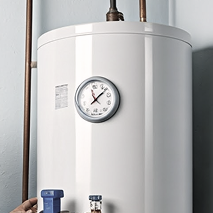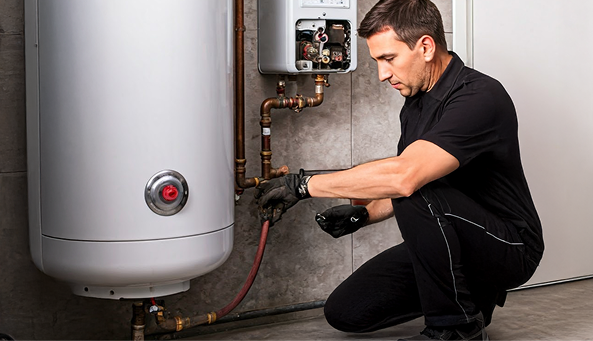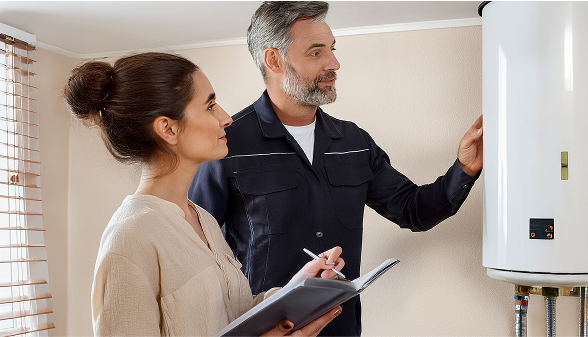
Water Heater Services in Hamilton, ON
A reliable supply of hot water is essential to the comfort and convenience of your home. At Bosanac Heating & Electric, we specialize in water heater installation, repair, and maintenance across Hamilton, ON, offering full-service solutions for both gas and electric models—whether tank or tankless.
Since 1956, our expert technicians have helped local homeowners choose the right system, resolve heating issues, and enjoy energy-efficient performance year-round.
Need Reliable Water Heater Services?
Gas Water Heater Solutions for Hamilton Homes
Natural gas water heaters remain a popular and efficient choice, especially during power outages. We offer installation and servicing for both storage tank and tankless gas water heaters, including conventional vent, direct vent, and power vent models.

Conventional Vent
Uses your home’s chimney or a double-wall metal flue. Works without electricity.
Direct Vent
Vents through an exterior wall and draws air from outside. Ideal when no chimney is available.
Power Vent
Uses an electric fan to exhaust air through a vent. Great when chimney access is limited.
We also install combination water and space heating systems, which use one gas-powered unit to heat both your water and your home. These systems can help maximize space and energy efficiency.
Storage Tank vs. Tankless Water Heaters
Whether you’re replacing an aging unit or upgrading your home’s energy performance, it’s important to choose the right water heater type for your needs.
Storage Tank Water Heaters
- Most common in Canadian homes
- Keep 30–100 gallons of hot water available at all times
- Ideal for families with higher hot water usage
- Lower upfront cost
Tankless Water Heaters (On-Demand)
- Heat water only when needed, reducing standby energy use
- More compact and space-saving
- Energy-efficient and ideal for smaller homes or secondary locations
- May qualify for rebates on high-efficiency models
Not sure which option is right for your home? Our experts will assess your needs and walk you through the best-fit models and venting options available.
Water Heater Repair in Hamilton
Experiencing water heating issues? Whether your water runs cold too quickly or your unit is making strange noises, we offer fast, affordable water heater repair services throughout Hamilton.
Signs You May Need Repairs:
Irregular Water Temperature
Discolored Or Rusty Water
Strange Popping Or Banging Sounds
Hot Water Running Out Too Quickly
Water Pooling Around The Unit
Visible Corrosion On Tank Or Fittings
Our certified technicians will quickly diagnose the problem and offer repairs that restore your system’s performance—and your comfort.
Maintenance & Emergency Water Heater Service
Routine maintenance can extend the lifespan of your unit and keep your energy bills in check. We offer comprehensive service packages that include:
Flushing sediment from the tank
Inspecting heating elements and burners
Checking thermostat calibration
Cleaning vents and checking for leaks
And in urgent situations, we offer emergency water heater repair in Hamilton and nearby communities.
Rental vs. Purchase – What’s Right for You?
Renting
Ideal for those who want peace of mind with emergency coverage, no repair bills, and easy upgrade options when your needs change.
Buying
A good option if you prefer to avoid monthly payments and want full ownership.
We offer flexible rental plans and affordable purchase options—you choose what works best for your household.

Why Choose Bosanac for Water Heater Services in Hamilton?
Serving Hamilton Homeowners Since 1956
Licensed, Trained, And Insured Technicians
Full Range Of Services: Install, Repair, Replace, Maintain
Tank And Tankless Expertise
Gas, Electric, And Combination Systems
Honest Pricing And Helpful Advice
Emergency Support
Free Estimates On New Installations
Our Service Areas
We proudly provide water heater services across Hamilton and the surrounding areas, including:
- Hamilton
- Ancaster
- Burlington
- Stoney Creek
- Dundas
- Waterdown
- Binbrook
- Grimsby
- Winona
- Flamborough
- Freelton
- Mount Hope
- Smithville
- Carlisle
- Puslinch
- Lynden
- Caistor Centre
- Rockton

Book Water Heater Service in Hamilton, ON Today
Whether you need help selecting a new system, or you’re facing urgent repair needs, Bosanac Heating & Electric is here to help. Trust our experienced team for water heater installation, maintenance, and repair in Hamilton—and enjoy hot water, whenever you need it.
or book your water heater service online today.

FAQs About Water Heater Services in Hamilton, ON
What types of water heaters do you service and install?
We service and install a wide range of water heaters including traditional storage tank, tankless (on-demand), and combination heating systems using natural gas, electric, or propane. We work with both residential and commercial properties.
How do I know if I need to replace my water heater?
Common signs include inconsistent water temperature, discolored water, strange noises, or leaks around the base of the tank. If your unit is over 10 years old and showing these symptoms, it may be time for a replacement.
What’s the difference between a tank and a tankless water heater?
Tank water heaters store and heat a set amount of water, while tankless systems heat water on demand. Tankless models are more energy-efficient and take up less space, but tank systems are typically more affordable upfront.
Do you repair water heaters in Hamilton and surrounding areas?
Yes! We provide fast and reliable water heater repair services in Hamilton, Ancaster, Dundas, Stoney Creek, Burlington, Grimsby, and nearby communities.
Can I rent a water heater instead of buying one?
Absolutely. We offer affordable rental options with no upfront equipment costs, plus maintenance and repairs are included for worry-free home comfort.
How long does a typical water heater last?
Most traditional storage water heaters last 8–12 years, while tankless units can last up to 20 years with proper maintenance.
Are there high-efficiency water heater options available?
Yes. We carry energy-efficient tankless and condensing gas water heaters that can help you save on utility costs and reduce your environmental impact.
Do you install direct vent or power vent water heaters?
Yes. We install conventional vent, direct vent, and power vent water heaters, and we’ll recommend the right system based on your home’s structure and venting requirements.
What brands of water heaters do you carry?
We install high-quality systems from trusted manufacturers like Rinnai, Navien, Rheem, and Bradford White, ensuring performance and durability.
How do I schedule a water heater repair or installation in Hamilton?
Just call (905) 545-3959 or book online. Our team will assess your needs and get your hot water flowing again quickly and efficiently.